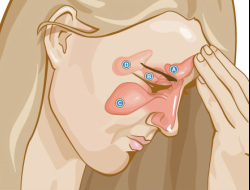 I have post nasal drip and when I lie down I have to keep swallowing or clearing my throat which keeps me from being able to fall asleep. What can I do about this? This is a common problem, especially for those who suffer from allergies. There are many good medicines on the market which can dry out your nasal passages and/or open your sinuses for better breathing. Sometimes teasing out the cause and selecting the right remedy can be tricky. I recommend speaking about this with your primary care doctor. Tip: If you do not want to use medicines of any kind (and many of my patients don’t), another way to go is nasal lavage. This involves the use of hypertonic saline (salt) wash to flush the nasal passages. Over the counter devices such as Neti Pot can be helpful. At our office we use ENT-Sol which is a more concentrated solution with an applicator that can apply more force to the flushing. These are inexpensive and natural methods for dealing with chronic sinus and nasal passage issues and can help with post nasal drip. The key is to perform lavage at least one hour before bedtime, as doing so can promote the drainage of congested passages increasing the likelihood of post-nasal drip for up to an hour.
0 Comments
The 90 Minute Cycle
Let’s break it down. Sleep takes place in ninety minute cycles. Each ninety minute cycle is broken down into six phases. In the first phase known as latency or ‘pre-sleep,’ we are just beginning the process of going unconscious. During this phase, two neurotransmitters (adenosine and GABA) as well as a hormone called melatonin (more about this later) act to lower body temperature, slow down brain activity, and inhibit body processes associated with wakefulness. We are not yet asleep, but we are no longer fully awake. Latency is followed by Phase I sleep, the first level of unconsciousness. At this point we no longer have awareness of our surroundings–we are asleep. Each of the four successive phases represent progressively deeper levels of sleep. As we go into the deepest levels the body undergoes profound physiological changes, releasing certain hormones and neurotransmitters, inhibiting the release of others, refreshing our brain circuitry, mobilizing the armed forces of the immune system to fight viruses and bacteria which infect us each day. During deep sleep our bodies go to work repairing stressed and damaged muscle, tendon, ligament, and skin tissue, and burning fat from our waists. Paradoxically, the deepest phases of sleep are also the most fragile; they can be easily disturbed by movement, noise, light, or other stimuli. The sixth (deepest) phase of sleep, called ‘REM’, is the phase during which we dream. It is also the phase during which the most important physiological restoration takes place. We cycle down to REM sleep and then back up to phase one, light sleep, over a period of ninety minutes. As adults, in order to get full restoration of our health we must have a minimum of four of these ninety minute cycles each night, but ideally we should have five to six of them. Each successive cycle includes more time spent in REM. How Much Sleep Do I Need?
Men need about eight hours of sleep each night. Women cycle through the phases of sleep slightly faster and on average need about seven to seven and a-half hours. But these numbers vary from individual to individual. I do best at seven hours and fifty minutes, which is pretty typical for men. My wife (whom I believe to be part cat) does best with just shy of nine hours. Do We Need Less Sleep As We Age? There is a myth that as people get older they need less sleep. In fact, while it is true that people tend to get less sleep as they age, is is not true that they need less sleep. There is a tiny structure, about the size of a small pea, which lies in the center of the brain, just behind the eyes. It is called the pineal gland and it produces a serotonin-based hormone called melatonin which helps to induce and maintain the sleep state. The pineal gland is the only endocrine gland that has communication with the outside world. It senses light through activation of receptors behind the eyes. In the absence of light, these receptors are quiet, and the pineal gland secretes melatonin which makes us sleepy and helps us to cycle down into deeper sleep. In the presence of light, the receptors become stimulated (even when the eyes are closed) causing them to signal the pineal gland to stop producing melatonin and initiating a reflex to induce wakefulness. The production of sleep-inducing melatonin in the dark and the shutting off of melatonin production in the presence of light, ties us to the cycles of day and night. The pineal gland is the control center of our circadian rhythm. The pineal glands of babies produce a lot of melatonin. A little less gets produced during childhood, but it is still a lot compared to the precipitous decline which takes place during adulthood. By the time we reach the age of 50, our pineal glands are able to produce only about 25% the amount of melatonin that we produced in our teen years. By age 70 we produce only 5-10%. High levels of melatonin production in infancy and childhood help to explain why children are able to drop suddenly into such deep sleep and to maintain sleep for nine, ten, or more hours. Similarly, progressively lower levels of melatonin helps account for the difficulty many people experience getting adequate sleep as they get older. But this does not mean that our bodies need less sleep as we age. It is more accurate to say that the aging process–the breakdown of healthy body tissues due to increased inflammation and diminished circulation–is exacerbated by lack of sleep, a problem which tends to accelerate as we age due in part to diminishing levels of melatonin. I Get Enough Sleep, So Why Do I Still Feel Tired? The right quantity of sleep is important for necessary restoration and recuperation. But equally important is the quality of the sleep that we get. Many of my patients report sleeping 7-8 hours per night, but they still wake up feeling tired and unrefreshed a clinically significant amount of the time (more than twice per month). Do you need coffee to get you going most mornings? Is it the rare morning when you wake up full of energy, feeling as though you’d slept just the right amount in order to feel great? If you are waking up feeling tired despite getting plenty of sleep, then you are probably experiencing poor quality sleep. REM, the deepest phase of sleep, is also the most fragile phase and is very susceptible to disruption. Noise, light, difficulty breathing due to excess fat in the throat area (sleep apnea), back pain, neck pain, shoulder pain, even the pressure of a full bladder can be enough to nudge us out of this most important phase, either waking us up, or almost waking us and causing the cycle to restart at pre-sleep or phase I without having spent any or enough time in REM restoring our bodies and brains. This is how we are able to get eight or more hours of sleep yet still wake up feeling tired and unrefreshed. We are simply not spending enough time during those eight hours in the deep restorative phases of sleep, especially REM. |
AuthorArchives
August 2021
Categories
All
|


 RSS Feed
RSS Feed